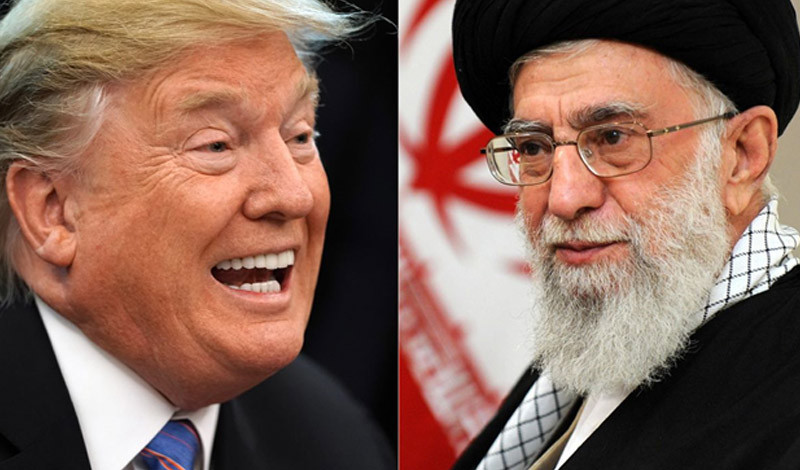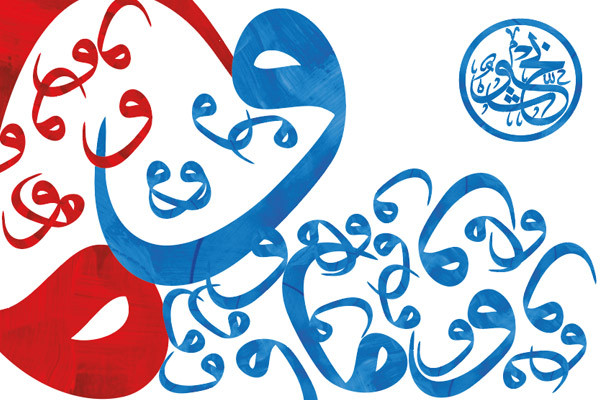American Sanctions dismantle Iran Proxies in The Middle East
On the eighth of May 2018, President Trump announced that the United States is withdrawing from the infamous Nuclear Deal with Iran. Then, the US administration re-imposed harder economic sanctions aimed to cripple Iran’s economy and prevent Iran from using the JCPOA deal to finance its direct and indirect expansion agenda in the Middle East.

- by Rasha Al Joundy ,
- Saturday, 23rd November, 2019
Although many researchers, observers and even US allies still question the effectiveness of this strategy, and its reflections on Iranian foreign policy, one cannot deny that In 2019, just one year later from these sanctions Iran and its proxies are facing a wide range of protests in their influence hotbeds, Iraq and Lebanon. In 2017 the New York Times issued an article explaining how powerful Hezbollah has become and how much it expanded sending fighters to Syria and trainers to Iraq and Yemen. Nowadays, Hezbollah feces Shiaa protesters in Nabatiyeh, Bint Jbeil, and Tyre, the areas where the party is most powerful. These protests are occurring among the people who went to war with Nasrallah to crush revolutions in neighboring countries. Almost all families in the Shiaa provinces lost a family member in Hezbollah’s pursuit of power. Those are the people who are participating in the demonstrations in Lebanon; chanting, “all of them means all of them, Nasrallah is one of them.” The Lebanese protesters are revolting against all the norms that made their lives unbearable and miserable. The norms that made them a chess pond in Iran’s regional plan of controlling the future of the Middle East.
An article published in Foreign policy titled “Iran’s Proxies Are More Powerful Than Ever,” concluded that the economic sanctions imposed by US administration did not work Ignoring the fact that Hezbollah is paralyzed in front of the protests because of the sanctions. Nasrallah is not able to affect his Shiaa base’s emotions using his charm or his religious superiority, Hezbollah cannot play on their fear of chaos, or to threat with a possible eruption of another civil war. Nasrallah keeps hinting to these horrible scenarios in his speeches. Being the cornerstone of Iran hegemony in the Middle East and beyond, one can only imagine how embarrassing the situation in Lebanon is for Hezbollah, and how astonished Iran and its proxy is, to see that none of the above threats worked to contain the people’s anger and disappointment.
Observers were surprised when Nasrallah admitted the hardship the Militia is having because of the American sanctions on Iran, Nasrallah had asked his base for financial contributions to continue the Militia activities. However, most observers did not measure the implications, and as a result, dismissed a vital fact: Hezbollah is not just a militia for Lebanese Shiaa, it does not play the same role of Hashed Al-Shaabi In Iraq for example. Hezbollah presents a social, economic, and security institution for them. It is the core of Hezbollah legitimacy, and one of the crucial secrets to its influence and control in the whole Country. A fact seems like Nasrallah himself did not comprehend, maybe Nasrallah thought he is the Khomeini of the Lebanese people! But he was wrong, the Lebanese were not Shiaa first but Lebanese. Therefore, For Hezbollah not being able to perform its financial duties towards its supporters it broke its powerful image, decreased its ability to contain any discontent in the Country. Why would the Lebanese people pay money along with their own lives to support Hezbollah activities sort of speak? Why would they play a role in Iran’s Persian pursuit of ancient imperialism?
These are the questions that popped up when Nasrallah reached a point when all his dark networks for Organized Crime, drug smuggling, Human trafficking in Africa, Latin America, and elsewhere were not enough to fill its corrupted needs. With American sanctions were back to bite Iran and its internal corrupted circles, there was not enough money to go around. The network of political corrupted allies, families controlling the political and Iranian financial system needed the fountain to keep rolling. Otherwise, the Islamic Iranian system would collapse.
Maintaining the system in Iran meant its proxies would suffer, and they would need to use other tools to stay in control. Hezbollah’s reaction to the demonstrations was to try to intimidate the demonstrators, by assault and use of force against them by the party’s forces. Nasrallah used the same Iranian approach, among them Ayatollah Ali Khamenei’s in explaining the Lebanese people’s discontent. For Iran and its proxies, the revolt is paid for and organized by ani-Iran foreign powers Like USA, Zionist and Saudi And Emiratis. This explanation is the only one Iran can imagen for any revolution that may decrease its hegemony, and the only rationale Nasrallah could delusionally accept for challenging the power he obtained in the last four decades.
Iraq, the crown jewel of Iran’s external hegemony, And the symbol of disastrous American decision in 2003 disrupting the balance of power in the Middle East. Iraqi people are also testing the weakness of Iranian so-called empirical power. Calling out the corrupted sectarian elites, whose affiliation with Iran had prevented this wealthy Country from rising-up from the rubbles after the American invasion, and then after fighting Al-Qaeda and now after defeating Daesh or ISIS.
To be clear, Iran did not fail in the calculation of Iraq’s importance; it is because of this importance, Iran directed its proxies to keep the Country as corrupt and as divided as they can. Iran did not fail in constructing legitimate political system in Iraq being the most powerful actor on the ground; on the contrary, Iran’s policy was to keep dependent, weak Iraqi political representative from all sects, to prevent any rise against its control in the Country. Iran will never forget Sadam Husain and the eight Iran-Iraq war in the 1980s. All Iraqis, including the Shiaa, are dangerous to Iran, they are all Iraqis, and Iraqis did not let down their identity when they demonstrated against corruption and inefficient governing. What Iran did not take into account is that people have limits for enduring misery, otherwise how Empires collapsed? Or Presidents toppled down? Those questions are not favorable to authoritarian regimes, and usually It is arrogantly ignored.
The most chanted slogans by Iraqi Protests were against Iran, and the most interesting one is “Iran out, out! Baghdad will be free!”. Iraq is different from Lebanon because It is a big wealthy country, Therefore Iraq can be robbed, extorted in many ways by the proxies, and can be made dependable on Iranian goods at the times when Iran’s economy is isolate from most of the world.
To finance its proxies in Iraq, Iran gave them the weaponry, monthly salaries. The militias were able to intimidate and act as a gang against the people, politicians were able to infiltrate inside the government and embezzle as much as they can. Generation after generation of well-organized corruption was favored and guaranteed as a good strategy. What happened after the sanctions, is that Iranian sponsorship to affiliated militia group stopped or dramatically decreased in Iraq. This resulted in more pressure from these groups for more extortion and gang-like actions. At the same time, Iraqi government and people were suffering from the destruction after ISIS war. The people are living in miserable conditions, and no one cared to give them the minimum relief to endure being out in camps, lacking medical aid, basic mental-health care, decent food, with high unemployment rates, it is a long list and decades of mistreatment and neglect. Iran and its proxies pushed for the history to repeat itself after Sadam, and even worse have Iraqi people lived after 2003, a lot of them sadly miss that kind of dictatorship, at least they had electricity, running-water, jobs, functioning system and did not face Continuous humiliation from a foreign power. All these facts were there before President Trump withdrawal from 2015 Iran Nuclear deal, but the situation in which Iran’s Proxies function freely did not reach the breaking point, loads of money helped preventing that. On the contrary, the deal gave Iran the ability to expand more and to give its proxies more aids, weapons, and flexibility to expand and control the social and political spectrum. In short, Iran had enough money and international Legitimacy to extend to its proxies in the Middle East, leaving the citizens of these Countries vulnerable, alone and without hope of a better future.
President Trump’s administration re-enforced the sanctions, the last was on Iran’s construction business, and maybe the most important one was on Iran’s central bank. Just one year of the withdrawal Iran was anxious about its fragile influence and how much this influence is linked to providing money to proxies and buying alliances, not loyalty or even ideological beliefs. Since Iraq is the Crown Jewel, and sadly the world is used to the scene of spelled Iraqi blood, the reaction from Iranian proxies was more viscous. Snipers were dispatched by Iran to kill and dismantle the ongoing protests. The death toll has resin to nearly 240, and the university students joined the demonstration to addon this terrible scene for Iran.
It is naive to say that Iran’s powerful paramilitary groups in Iraq that count for 100 thousand members, or Hezbollah that have a vast regional and dark international network would disappear because of the protests in Iraq and Lebanon. Nevertheless, it is the beginning, and most importantly it is a warning to Iran’s proxies that they need to be nationals first and agents to an ideology second, if they realized this fact, maybe they can survive for few more decades, but if they didn’t, and that’s more probable for these kinds of groups, these proxies will face growing resistance to their power and their linkage to Iran a hostile foreign country.
For Iran, It has a long experience of cracking-down on dissent, the green movement in 2009 as a security experiment still lives within Iranian people’s memory, by the cruelty been used and disengagement of any human emotion from the Basij militiamen. Most probably, Iran will use this experience to maintain its hegemony on these nations, Lebanon and Iraq. American sanctions exposed the extent of Iran’s vulnerability without its money fountain. American sanctions may not stop Qassim Soleimani from going to Iraq and head the security meetings or give orders to paramilitary groups to kill protests without hinging. Nevertheless, these sanctions gave the people in Iraq and Lebanon a chance to see the reality, more closely, and to choose to dismantle the Iranian hegemony from inside, and maybe this will extend to militias close to Iran itself with growing pressure.
In the Middle East, nobody cares about how Iran is governed, or if its regime is toppled down anytime soon, this is the burden of the Iranian people, their choice. What concerns the Middle eastern countries is how Iran interacts with its neighbors, and how benign or disruptive its policies are to them, this is up to the Iranian government to decide. For now, What Iran sowed it reaped, Anger, and hostility. Needless to say, American sanctions have contributed in overcoming the delusion which Iran created, an everlasting Iranian hegemony, rather called modern occupation In Arab countries. Now Iran’s proxies can be dismantled, Iran as a normal country should take care of its heart, Tehran, and the Lebanese can take care of theirs Beirut, Iraqis can take back their beloved Baghdad.

Rasha Al Joundy
Research Supervisor
Read More
Areas of Expertise
- Expert in the Gulf region politics,
- Security and internal affairs and has been working on the GCC region since 2011.
Education
- Master’s degree in International Relations and World Order at Leicester University (UK 2016).
- Graduated from the Faculty of Law – University of Damascus in Syria in 2006
Bio
completed her master’s degree in International Relations and World Order at Leicester University (UK 2016). She graduated from the Faculty of Law – University of Damascus in Syria in 2006, and trained as a lawyer to register at Damascus bar association. She is an expert in the Gulf region politics, security and internal affairs and has been working on this region since 2011. Rasha Currently work as a senior researcher for Gulf affairs and supervise the training program at Dubai Pubic Policy Research Centre.

